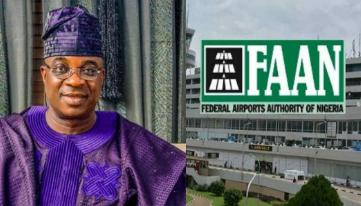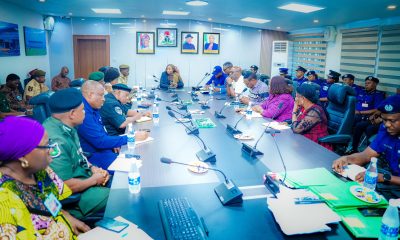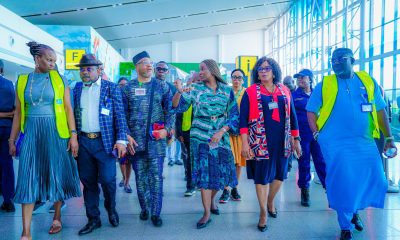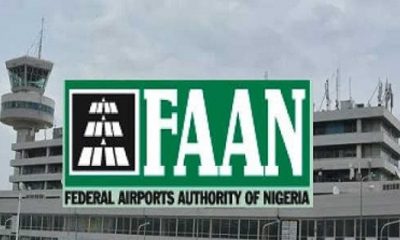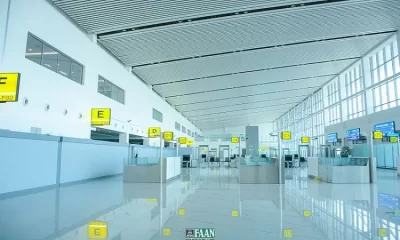By ISAAC TERSOO AGBER
SINCE the nation’s airports rated among worst in the world with particular reference to the Port Harcourt International Airport and other international wings in major cities like Lagos, Kano and Abuja, pundits in the aviation industry have continued to vent their spleen on the Federal Airports Authority of Nigeria (FAAN) for being grossly incompetent at managing the airports effectively.
In their critical submissions, FAAN is drawing huge revenue from concessionaires, yet failing to upgrade and maintain infrastructure at the nation’s aerodromes that serve as gateways to foreign investors, tourists and expatriates, as all the international terminals are in a dilapidated state, giving the country a bad image. The Managing Director of Bi-Courtney Aviation Services Limited (BASL), concessionaire of the Murtala Muhammed Airport Terminal Two (MMA2), Lagos, Mr. Christophe Penninck, said only the international wing of the airport generates revenue that is 12 times more than what is generated at the MMA2 in a year. Yet, there is a glaring difference between the two airports in terms of sophistication, state-of-the-art facilities, well-coordinated security management and excellent passenger service.
Pennick adduced that FAAN has abused its regulatory onus by not being transparent in managing its revenue. I his words: “I think FAAN has failed. It cannot present good performance; not transparent with their revenue, tenders and hiring processes.” According to him, the agency cannot prioritize on the essentials such as: maintenance of current terminals, securing power/electricity, runway upgrades and that there is no drive to seek for new airlines or support stakeholders.
He gave a striking example that the MMIA was originally designed like Schiphol Airport in Amsterdam. But now, Schiphol has expanded almost 10 times the size of MMIA. He said the terminal has been there for over 30 years with the same facilities, which have now become weak and obsolete, questioning what FAAN has been doing with the billions it’s been generating from the wing over these years.
He also criticized the agency for being quick at constructing new structures instead of upgrading the existing ones. He mentioned that the plan to construct a second runway at the Nnamdi Azikiwe International Airport, Abuja, for instance, was a misplacement of priority, considering the amount of money the project will gulp. Siting example with South Africa, which is currently planning a second runway that costs $300 million, Pennick said that sum is equivalent to N72 billion if Nigeria wants to do same. But, according to him, the country will spend much less from the said amount to upgrade the existing runway and still have a lot left for other projects.
He advised that the Federal Government should urgently consider privatizing FAAN or strip it of the authority to control revenue from concessionaires and establish a reliable Public Private Partnership to manage and maintain airport facilities. According to him, that is the only way the country can redeem its image.
Penninck stated this while presenting a paper titled, “Airports of the Future: The Model For Nigeria” at this year’s safety summit of Association of Foreign Airlines in Nigeria (AFARN) held in Lagos on Thursday, December 10, 2015.
Also expressing disappointment at the current security operations at all the nation’s airports, Retired Captain John Ojikutu, observed that FAAN has granted too many concessions at the MMA and other airports as many exit points that have been converted into shops, leaving little or no space for exit in case of emergency. He said the situation calls for urgent review of the original plans of the airports, considering the danger it portends to all passengers, airlines, security agents and other ground handlers.
Ojikutu said he always felt ashamed and defenseless when foreigners refer to the nation’s airports as eyesores in an overrated country, adding that such can’t be found in the list of African nations.
Another Retired Captain, Dele Ore, also called on the government to involve the private sector in the commercial activities of the industry and reduce the responsibility of the agencies, particularly FAAN in too many concessions. He recommended that the government must think of a legal framework for infrastructure development instead of vesting the whole onus on a single authority, which is currently under heavy criticism for gross mismanagement.

 Health5 days ago
Health5 days ago
 Entertainment7 days ago
Entertainment7 days ago
 Crime6 days ago
Crime6 days ago
 Education1 week ago
Education1 week ago
 Health1 week ago
Health1 week ago
 Comments and Issues6 days ago
Comments and Issues6 days ago
 Football7 days ago
Football7 days ago
 Latest6 days ago
Latest6 days ago

